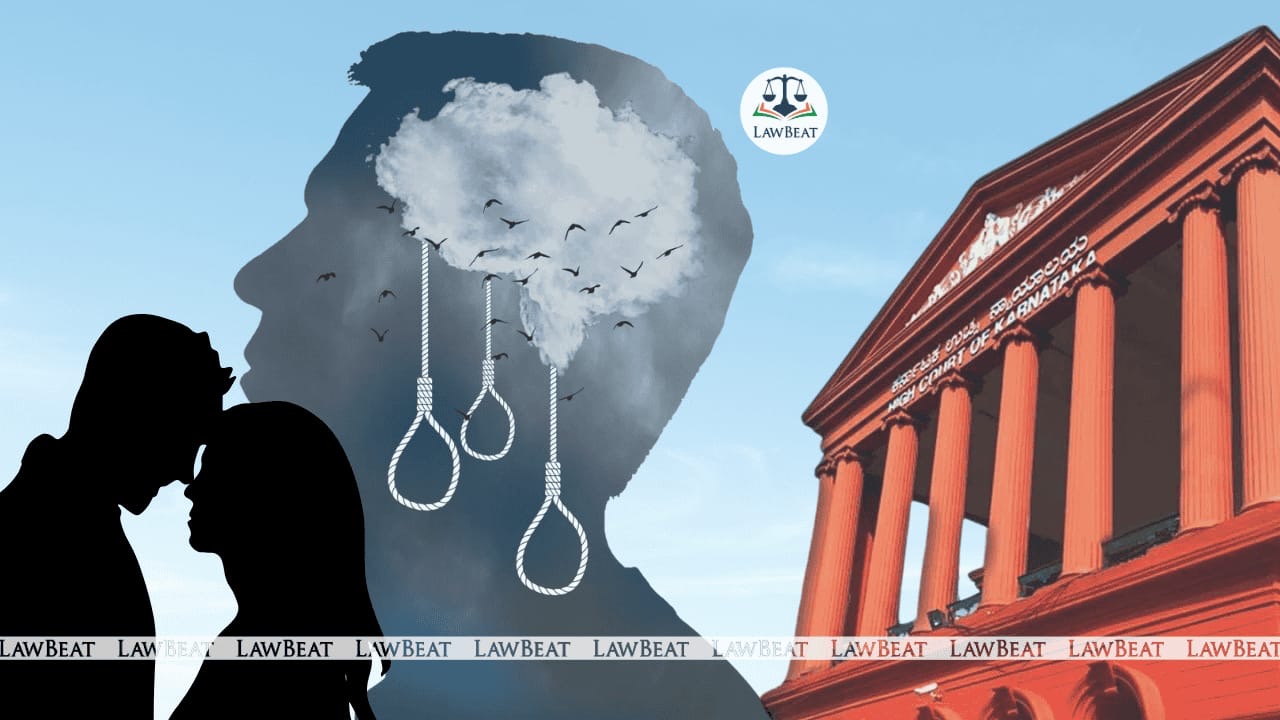Wife’s Paramour Telling Her Husband to 'Go Die' So They Can Live Happily Not Abetment to Suicide : Karnataka HC

The court noted that the act of wife having illicit relationship does not amount to abetment to commit suicide
The Karnataka High Court has ruled that a wife’s paramour asking her husband to “go die”, so they can live happily together, cannot be considered abetment of suicide within the meaning of Section 306 of the Indian Penal Code (IPC).
Justice Shivashankar Amarannavar, presiding over the case, quashed the conviction order passed by the trial court against the wife (Accused No. 1) and her paramour (Accused No. 2). The court noted, “Merely because the accused persons asked the deceased to go and die so that they can life happily will not amount to abetment.”
The case revolved around the suicide of the woman’s husband, who was found hanging from a tree on the night of July 15, 2010. Tensions between them arose due to her alleged relationship with another man. Witnesses stated that the deceased often quarrelled with his wife over this relationship. Days before the suicide, the woman’s paramour reportedly told her husband, in front of their home, to “go die” so that he and the woman could live happily together. Based on these events, the trial court convicted the woman and her paramour, sentencing them to three and four years of rigorous imprisonment, respectively, with fines of ₹5,000 each.
Counsel for the appellants/ accused, Advocate AN Radha Krishna, argued that the evidence presented by the prosecution, including testimonies from relatives and politically motivated witnesses, failed to meet the threshold for abetment under Section 107 of the IPC. It was highlighted that mere verbal provocation, particularly in a heated moment, does not equate to instigation, as defined by law.
On the other hand, High Court Government Pleader B Lakshman, representing the prosecution case, contended that the trial court had rightfully assessed the evidence, which included the testimonies of key witnesses, to establish that the accused contributed to the deceased’s state of mind.
The court, after examining the facts and circumstances of the case, emphasised that mere words spoken in anger or during altercations do not satisfy the legal requirements for abetment unless accompanied by persistent and direct incitement to suicide. “It appears, that the deceased was sensitive as his wife - accused No. 1 had illicit relationship with accused No. 2 and upset by that, he might have committed suicide. The evidence on record will not establish that the accused persons, by their acts, abetted the deceased to commit suicide,” the court observed.
Delving into the definition of ‘Abetment’, provided under Section 107 of the IPC, the court stated, “Merely having illicit relationship and quarrelling with the deceased does not amount to abetment as defined under Section 107 of IPC.”
Citing precedents from the Supreme Court established in the cases of Sanju alias Sanjay Singh Sengar Vs Sate of M.P [2002], Chitresh Kumar Chopra Vs State (Government of NCT of Delhi) [2009], Ude Singh and Other Vs State of Haryana [2019], and Mangat Ram Vs State of Haryana [2014], the court noted that “A person may attempt to commit suicide due to various reasons such as depression, financial difficulties, disappointment in love, tired of domestic worries, acute or chronic ailments and so on and need not be due to abetment.”
The High Court concluded that, in the present case, “The act of accused persons having illicit relationship does not amount to abetment to commit suicide.” There must be evidence indicating that the accused intended, through specific acts, to instigate the deceased to take their own life. Without fulfilling the elements of instigation or abetment, a conviction under Section 306 of the IPC cannot be sustained.
As a result, the court set aside the conviction of the accused persons, stating that “the learned Sessions Judge has erred in convicting the accused persons for offence punishable under Section 306 of IPC.”
Cause Title: Prema v State of Karnataka [CRL.A No. 54 of 2013]
